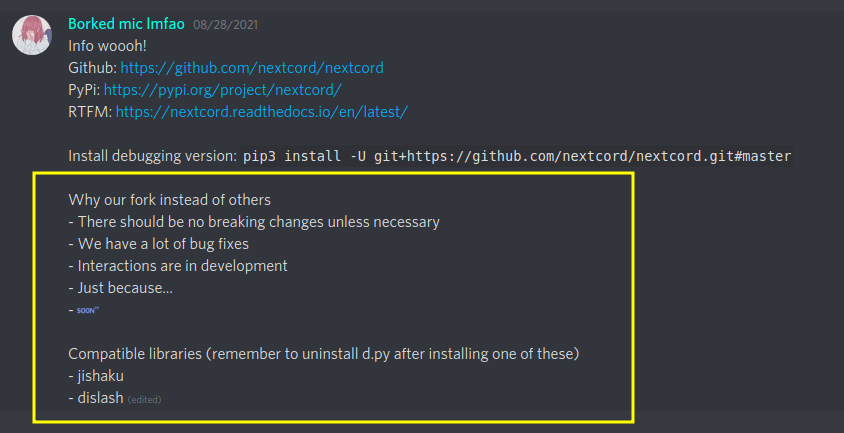A modern, easy-to-use, feature-rich, and async-ready API wrapper for Discord written in Python.
- Modern Pythonic API using
asyncandawait - Proper rate limit handling
- Optimised in both speed and memory
Python 3.8 or higher is required
To install the library without full voice support, you can just run the following command:
# Linux/macOS
python3 -m pip install -U nextcord
# Windows
py -3 -m pip install -U nextcordOtherwise to get voice support you should run the following command:
# Linux/macOS
python3 -m pip install -U "nextcord[voice]"
# Windows
py -3 -m pip install -U nextcord[voice]To install additional packages for speedup, run the following command:
# Linux/macOS
python3 -m pip install -U "nextcord[speed]"
# Windows
py -3 -m pip install -U nextcord[speed]To install the development version, do the following:
$ git clone https://github.com/nextcord/nextcord/
$ cd nextcord
$ python3 -m pip install -U .[voice]Please note that on Linux installing voice you must install the following packages via your favourite package manager (e.g. apt, dnf, etc) before running the above commands:
- libffi-dev (or
libffi-develon some systems) - python-dev (e.g.
python3.8-devfor Python 3.8)
import nextcord
from nextcord.ext import commands
bot = commands.Bot()
@bot.slash_command(description="Replies with pong!")
async def ping(interaction: nextcord.Interaction):
await interaction.send("Pong!", ephemeral=True)
bot.run("token")You can find more examples in the examples directory.
NOTE: It is not advised to leave your token directly in your code, as it allows anyone with it to access your bot. If you intend to make your code public you should store it securely.






